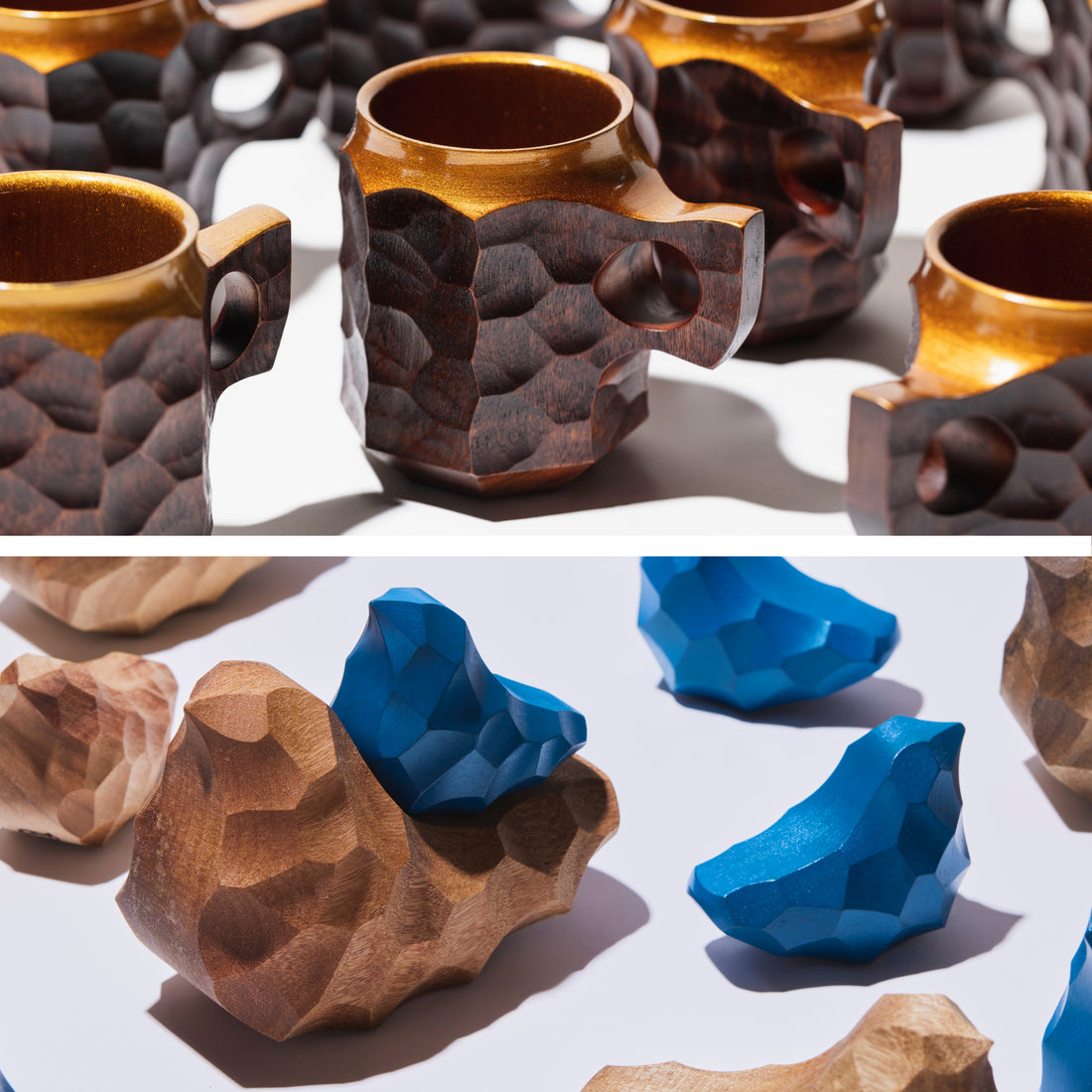
Share
THE SHOW
Akihiro Woodworks
June 3rd - 18th, 2023
In this exhibition, we will exhibit works that trace the history of the "jin cup," which originated from a cup created by Jin Akihiro for his mother's 50th birthday in 2007. Alongside we will also present Taku Akihiro's impressive sculptures.



We will be hosting a reception on June 3rd to kick off the exhibition. Artists Jin Akihiro and Taku Akihiro will be in attendance on that day. Everyone is welcome to join, so please feel free to stop by.
Date: Saturday, June 3rd
Time: 5:00 pm - 8:00 pm
Location: 50 Norman Ave, Brooklyn, New York 11222
RSVP: send email with your full name and email
*The RSVP deadline is until June 23rd at 23:59
brooklyn@cibone.com
[Exhibition information]
THE SHOW
Akihiro Woodworks
June 3rd - 18th, 2023
Akihiro Woodworks

Jin Akihiro

Taku AKIHIRO
We conducted an interview about their craftsmanship.
Q: Please tell us about how you started making the jincup.
Jin : The first prototype was made in 2007 as a present for my mother's 50th birthday. At the time, I was a young man without money who was making my own work while helping my father make furniture, so handmade gifts were the only thing I could do.I used scraps of wood from my father's furniture production. I remember that it took a lot of time and effort because I was not skilled enough. After more than a year, I was able to make a work of a certain level of quality, and I began to receive orders little by little.

Q: Could you provide more details about the wood used in your creations?
Jin : Initially, I tried using readily available woods such as camphorwood, Castanopsis, and jumby tree. However, after several years of trial and error, I decided to use Machilus, a wood with high density, resilience, and good workability. Machilus can be found throughout Japan, and the mild climate of Kagoshima in southern Kyushu is ideal for its growth. The drying period for the wood varies depending on its thickness and species, but it typically takes three to five years for it to dry properly and become usable. We acquire logs by bidding at the local lumber market or directly purchasing them from woodcutters in southern Satsuma. These woodcutters are not cutting trees to sell at the market, but rather they make a living by being asked to clear mountains by clients or by being granted permission by the mountain owners to cut trees. The owners need to periodically cut down trees to maintain the mountain, and in most cases, the trees are transported to Makurazaki as firewood for smoking to make dried bonito flakes. However, if the trees are too large, they are either put on the market or sold directly to us, taking into consideration the labor involved in splitting firewood, among other factors. The mountains that have been cut down immediately begin to regenerate, becoming a forest in a few years, and after 50 years, some large trees will grow.

Nowadays, with easy access to high-quality wood from around the world and the development of the Internet, the shape of woodworking products has become somewhat standardized, for better or worse. I aspire to be a woodworker who understands the characteristics of local wood and pursues forms that suit those characteristics, and who understands the cycle of local forests.
Q: How do you derive energy for your craftsmanship from daily situations and moments?
Taku : I walk through everyday life by hypothesizing about everything around me. By forming hypotheses and inputting them, every aspect of my daily life becomes an act of verification. I imagine the grain of a large tree I encountered in the forest, or envision the history of a piece of wood based on its grain pattern in a wood storage warehouse. I also imagine the intentions of a TV commercial producers I admire while watching TV, or imagine the favorite anime of a child I pass by on the street wearing sneakers that catch my eye. By doing so, there are moments when the hypotheses I previously formulated come together when I sit at my desk and sketch in my sketchbook or when I face the wood in the workshop and create something.

Q: Please tell us about your uncompromising dedication in the process of creating things.
Taku : It is the act of creating with what is already there. By maintaining this stance, the core of the story of the completed work remains steady and unwavering.
Q: What inpired you?
Taku : Novels by Ryotaro Shiba, the GUNDAM animation series, animation works from Hayao MiyazakiI learn alot from diving into the world of novels and movies/flims.

Q: Is there anything you would like to convey through your works this time?
Taku : In order to be of service to others in this ever-changing world, we have been relentlessly focused on what is right in front of us. Reflecting on this moment and looking back, I am reminded of the feelings I had as a student who only drew self-portraits. Thanks to countless individuals including family, friends, colleagues, and clients, I am filled with a sense of gratitude for being able to live like this. Thank you very much.Moreover, when I look forward, I have realized that this is just the starting line. And that I have yet to see is a future wide open before me.It is used to drink coffee every day.Chosen as a gift for someone special.Sometimes it breaks and becomes unusable.I hope that your experience with the jin cup will become a valuable nourishment for a wonderful life.

